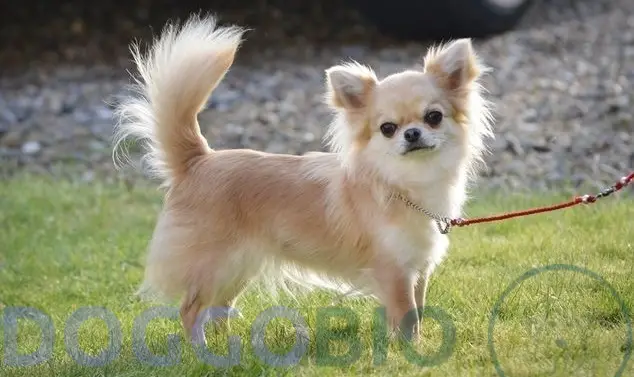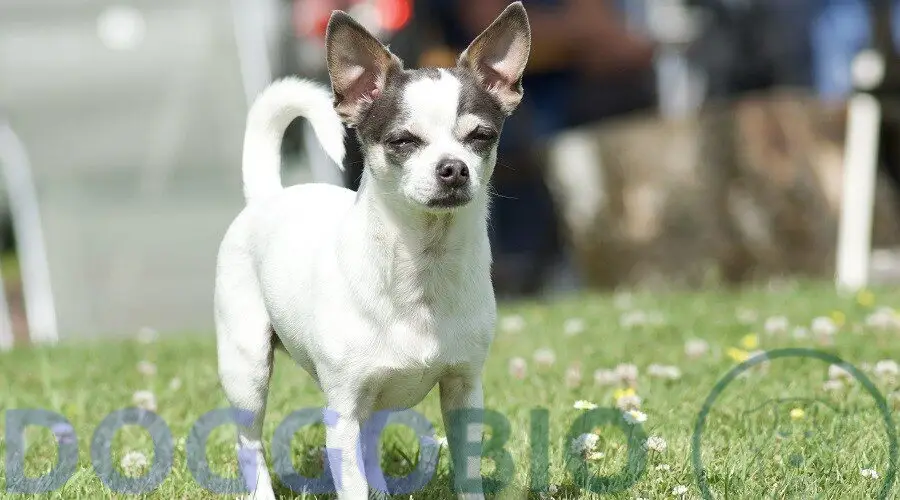Introducing the captivating and endearing canine blend that is the Jack Russell Chihuahua mix. This delightful crossbreed brings together the spirited energy of the Jack Russell Terrier and the charming charisma of the Chihuahua, resulting in a pint-sized puppy that is both dynamic and affectionate.
With a unique blend of traits from its parent breeds, the Jack Russell Chihuahua mix is a small yet mighty companion that will surely capture hearts with its vibrant personality and undeniable charm.
In this introduction, we delve into the characteristics, temperament, and care requirements of this one-of-a-kind hybrid, shedding light on the beautiful world of the Jack Russell Chihuahua mix.
Brief overview of Chihuahua Jack Russell Mix
| Other Names | Jackhuahua |
| Type | Mixed Breed |
| Weight | 8-15 pounds |
| Height | 10-15 inches |
| Coat | Short, smooth, or wirehaired |
| Color | Black, chocolate, fawn, golden, cream, white, or a mix of these colors |
| Lifespan | 13-18 years |
| Temperament | Energetic, playful, loyal, intelligent, independent, stubborn |
| Activity Level | High |
| Grooming Needs | Low |
| Good with Children | With older children who know how to handle small dogs |
| Good with Other Dogs | Can be with proper socialization |
| Health Concerns | Patellar luxation, deafness, allergies |
What is Jack Russell Chihuahua mix?

The world of designer breeds is vast, but the Jack Russell Chihuahua mix, fondly known as the Jack Chi, holds a special place.
This breed encapsulates the Jack Russell Terrier’s vivacity and the Chihuahua’s audacity. Their combined traits produce a visually appealing dog that is brimming with character. Their small stature juxtaposes their boundless energy, making them a delightful paradox.
Parent Breeds of Jack Russell and Chihuahua mix
History of Jack Russell Terrier

The Jack Russell Terrier, named after Reverend John Russell, has its roots in the rugged terrains of England.
Bred primarily for fox hunting, this breed was designed to be agile, brave, and relentless. Their keen sense of smell and high energy levels made them exceptional at tracking and chasing foxes.
Over the years, their popularity spread beyond hunting, and they found their way into homes and hearts worldwide.
History of Chihuahua

The Chihuahua originates in ancient Mexico and is one of the oldest known dog breeds.
Historians believe this breed was considered sacred by the Toltecs and later by the Aztecs. These tiny dogs were often found in ancient paintings, sculptures, and artifacts, indicating their significance in ancient cultures.
Their small size, combined with their bold personality, made them favorites among royalty and commoners alike.
What does a Jack Russell Chihuahua mix look like?

Size, height, and Weight
Standing at 10 to 15 inches, they are the perfect lap-sized companions. Their Weight, ranging from 10 to 20 pounds, adds to their charm.
This compact size makes them ideal for apartment living and homes with yards.
Coat colors and Types
Their coat is a canvas of beauty, from deep blacks to pristine whites and everything in between.
The texture, which can range from sleek and straight to wavy and long, adds another layer of diversity to their appearance.
Temperament and Personality
The Jack Russell Chihuahua mix is a bundle of joy and energy. Their zest for life is infectious, and they enthusiastically approach every day.
They are fiercely loyal to their families and often form strong bonds with their human companions. Their intelligence and playful nature mean they’re always up for a game or a challenge.
However, they can be a tad stubborn, a trait they inherit from both parent breeds. This stubbornness, though, is often overshadowed by their affectionate and loving nature.
Training and Exercise Requirements
Training a Jack Chi can be both a challenge and a joy. Their sharp minds pick up commands quickly, but their stubborn streak might require patience. Consistency is vital when training them.
As for exercise, their energetic nature demands regular play sessions and walks. A bored Jack Chi can become destructive, so keeping them mentally and physically stimulated is essential.
Grooming and Cleaning
While not overly demanding, Jack Russell Chihuahua mix’s grooming needs require consistent attention.
- Depending on its length and texture, their coat might need regular brushing to prevent matting.
- Their love for outdoor activities means they often return home with a skin full of dirt and debris, necessitating regular baths.
- Regular nail trimming and ear cleaning are essential to keep them looking and feeling their best.
Food and Diet
The dietary needs of the Jack Russell Chihuahua mixes are specific, given their high energy levels. Their meals need to be a balance of protein, fats, and essential nutrients to fuel their daily activities. Monitoring their calorie intake is crucial, given their propensity to gain weight if overfed.
Life Expectancy and Common Health Issues
The Jack Chi, a delightful blend of the Jack Russell Terrier and the Chihuahua, is generally a robust and hearty breed. They can lead a fulfilling life with proper care, attention, and regular veterinary check-ups, often between 13 and 18 years.
However, like all breeds, they are predisposed to certain health conditions inherited from their parent breeds. Awareness of these potential health issues can help owners take preventive measures and ensure their furry friend’s well-being.

1. Hypoglycemia
Hypoglycemia, or low blood sugar, is a condition that can affect small breeds like the Jack Chi. Symptoms can include lethargy, tremors, and, in severe cases, seizures. Regular feeding schedules and monitoring for signs can help manage and prevent this condition.
2. Dental overcrowding
Given their small size, Jack Chis can have dental issues due to overcrowding of teeth. Regular dental check-ups, brushing, and chews can help maintain oral health and prevent complications.
3. Eye problems
Both parent breeds can pass on a predisposition to certain eye conditions, such as cataracts or progressive retinal atrophy. Regular eye check-ups and being vigilant about any changes in their eyesight or appearance can help in early detection and treatment.
4. Patellar luxation
This condition, where the kneecap dislocates or moves out of its natural position, is common in smaller dog breeds. Symptoms can include limping or an abnormal gait. Regular vet check-ups can help in early diagnosis, and surgical intervention might be necessary in severe cases.
5. Allergies
Jack Chis can be prone to skin allergies, which environmental factors, food, or flea bites can trigger. Regular grooming, hypoallergenic diets, and preventive flea treatments can help manage and reduce allergic reactions.
6. Tracheal collapse
This condition is where the trachea, which carries air to the lungs, weakens and collapses. Symptoms can include a honking cough, especially after excitement or exercise. Weight management, avoiding neck collars, and regular vet visits can help manage this condition.
How Much is a Jack Russell Chihuahua mix?
A Jack Russell Chihuahua mix can range from $200 to $750 or even more, depending on various factors. These factors include the breeder’s reputation, the lineage of the puppy, and even the region or country where you’re making the purchase.
While it might be tempting to opt for a cheaper option, it’s essential to remember that a lower price might also mean potential health issues or unethical breeding practices. Additionally, potential owners should factor in the costs of vaccinations, regular vet check-ups, grooming, training, and quality dog food.
How Can I Find a Jack Russell Chihuahua Mix for Sale?
Finding the perfect Jack Chi requires more than just a simple online search. It’s about connecting with reputable breeders who are passionate about the breed.
Start by visiting local dog shows or breed-specific events. Engage with breeders, ask questions, and understand their breeding philosophy.
Always request to see their breeding facility. This allows you to gauge the dogs’ living conditions and ensures you’re not inadvertently supporting puppy mills.
Additionally, consider checking with rescue groups or shelters. Many Jack Chis are looking for a second chance at a loving home.
Is a Jack Russell Chihuahua mix Right Dog for Me?
The decision to bring a Jack Chi into your life should not be taken lightly. While they are undoubtedly charming and full of life, they also come with their requirements. They thrive on attention and require regular exercise to channel their energy positively.
If you lead an active lifestyle and are looking for a companion to share in your adventures, the Jack Chi might be the perfect fit.
However, it might be worth reconsidering if you’re away from home often or need more time to dedicate to their training and care.
List of dogs that are similar to Jack Russell Chihuahua mix
- Jack Russell-Beagle Mix
- Jack Russell-Lab mix
- Jack Russell-Pomeranian mix
- Jack Russell-Pug mix
- Jack Russel-Blue Heeler mix
- How Long Do Jack Russells Live?
- Chihuahua-Golden Retriever Mix
- Chihuahua-Shiba Inu Mix
- Chihuahua-Blue Heeler Mix
- Chihuahua-Husky Mix
- Chihuahua-Maltese Mix
Frequently Asked Questions
Does AKC recognize the Jack Russell Chihuahua mix?
No, the American Kennel Club (AKC) does not officially recognize the Jack Chi, as it predominantly acknowledges purebred breeds.
However, the Jack Chi, a designer or hybrid breed, is recognized by other entities like the American Canine Hybrid Club (ACHC) and the Designer Breed Registry (DBR). It’s always good to check with specific organizations for their current breed listings.
How do you potty train a Jack Russell Terrier Chihuahua Mix?
Potty training a Jack Chi requires patience, consistency, and positive reinforcement. Start by establishing a routine, taking them out first thing in the morning, after meals, and before bedtime. Praise and reward them when they do their business outside. If accidents happen indoors, avoid punishment; clean up promptly and continue with the routine.
Is a Jack Chi Aggressive?
No, Jack Chi is typically affectionate and friendly. However, they can display aggressive behaviors if they need to be adequately socialized or perceive a threat.
Introducing them to various environments and experiences early on is crucial, and using positive reinforcement techniques to ensure well-rounded behavior is vital.
Is a Jack Chi Easy To Train?
Yes, Jack Chis are generally receptive to training due to their intelligence and desire to please. Yet, they might exhibit stubbornness, a trait that can be traced back to both parent breeds.
To ensure practical training, it’s essential to employ consistent methods, patience, and positive reinforcement.
How long does a Jack Russell Chihuahua mix live?
With proper care, a balanced diet, and regular veterinary check-ups, Jack Chis has a life expectancy of 13 to 18 years.
How big does a Jack Russell Chihuahua mix get?
Typically, a Jack Chi will stand between 10 to 15 inches tall at the shoulder and weigh between 10 to 20 pounds, depending on the dominant genes.
Does a Jack Russell Chihuahua mix shed a lot?
Yes, Jack Russell Chihuahua mixes, or Jack Chis, exhibit moderate shedding. Consistent grooming is recommended to keep it under control and maintain their coat’s health.
Are Jack Russell Chihuahua mixes hypoallergenic?
No dog is truly hypoallergenic, but Jack Chis is not considered hypoallergenic due to its short to medium-length coat. Regular grooming can help reduce allergens.
Does a Jack Chi get along with other pets?
Yes, Jack Chis generally adapts well when introduced to other pets at a young age. Yet, due to their inherent terrier traits, they might tend to pursue smaller animals.
It’s essential to be mindful of this and ensure proper training to foster peaceful coexistence.
Are Jack Chis good with kids?
Yes, Jack Chis typically bonds well with children, mainly when they grow up together. Given their petite stature, it’s crucial to instruct kids on gentle handling to ensure the safety and comfort of the dog.
Are Crossbreeds Healthier than Purebred Dogs?
Yes, crossbreeds, such as the Jack Chi, are often considered to have fewer health issues because of their diverse genetic makeup. This can lead to fewer breed-specific ailments.
However, it’s vital to understand the potential health risks associated with both parent breeds. Consistent veterinary care remains paramount for all dogs, regardless of their lineage.
Conclusion
The Jack Russell Chihuahua mix, with its vibrant personality and compact size, is a delightful addition to any household.
Their unique blend of the Jack Russell Terrier’s energy and the Chihuahua’s sass makes them stand out in the canine world.
Proper care, love, and attention ensure that they lead a healthy, fulfilling life, bringing joy to their owners for years to come.

Pingback: Jug Dogs: A Perfect Blend of Two Beloved Breeds 2023
Pingback: Jack Russell Lab Mix: Boundless Energy Unleashed 2023
Pingback: Jack Russell Pomeranian Mix: Discover the Adorable Breed 2023
Pingback: How Long Do Jack Russells Live? Nurturing a Lifetime 2023
Pingback: Beagle Jack Russell Mix: Energy and Unbreakable Loyalty 2024
Pingback: Blue Heeler Jack Russell Mix: Revealing Hidden Wonders 2024